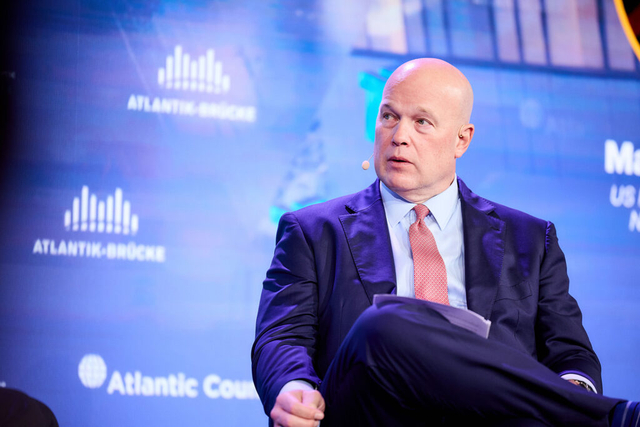
US Ambassador to NATO Matthew Whitaker on Tuesday called on European and Canadian allies to accelerate defense spending and immediately stop purchasing Russian energy, arguing these steps are crucial to crippling Moscow’s war machine and forcing a resolution to the conflict in Ukraine.
Speaking at a forum in Brussels, hosted by The Atlantic Council, Ambassador Whitaker stressed that while the alliance is prioritizing the commitment of all members to meet new defense spending targets, the “resolution of the war in Ukraine” remains a top issue for NATO.
JOIN US ON TELEGRAM
Follow our coverage of the war on the @Kyivpost_official.
“Starve the Russian war machine”
Against this backdrop, Ambassador Whitaker delivered a pointed message to allies still reliant on Russian energy, saying that continuing these purchases undermines sanctions and thus prolongs the “completely unnecessary” conflict.
Whitaker stated bluntly, “If allies are serious about bringing peace to Ukraine, they need to starve the Russian war machine and stop purchasing Russian energy,” explaining that “Once they do that… there’s a clear path to additional US and European sanctions to impose even more costs and change the calculation for the Russians to come to the negotiating table.”
In a specific call-out, he cited countries like Hungary and Slovakia, which still purchase “almost a hundred percent” of their oil and gas from Russia, as well as Turkey.
Other Topics of Interest
Trump Boasts of Submarine Deployment But His Focus Now on Enemy Within
Trump’s revelation of a submarine deployment to counter Medvedev’s threats is eclipsed by the military purge and congressional backlash over the erosion of US foreign policy focus.
Whitaker acknowledged the difficulty for landlocked nations with direct Russian pipelines, but he insisted that ultimately, “we have to do these hard things.”
Defense spending
The Ambassador then turned to the other critical alliance priority, reiterating the US expectation that European NATO allies meet the new 5 percent defense commitment established at the recent summit in The Hague, which includes 3.5 percent on NATO capability targets and an additional 1.5 percent on defense-related spending.
Although Whitaker praised the Hague commitment as a “good start,” he lamented that “some of our allies are dragging their feet, and they need to pick up the pace.” He emphasized that these financial investments are vital for the “capabilities, security, stability, and quite frankly the credibility of NATO.”
To illustrate progress, Whitaker highlighted Germany’s commitment to meet the targets within four years, along with the strong performance of Eastern Flank nations like Poland and the Baltic states (Estonia, Latvia, Lithuania), which are already investing heavily due to their clear-eyed view of the Russian threat.
However, there remains a need for action from larger economies; he urged countries like Spain and Italy to get serious, and expressed a continued need to monitor France and Great Britain, where he suggested economic conditions and borrowing capacity pose challenges to meeting the goals.
Whitaker specifically addressed “the expectations of the US government towards European NATO members to fulfill the newly implemented percent goal and unpacking what’s at stake for the alliance.”
Shift on Ukraine aid and Russian stagnation
In shifting to US policy, Whitaker stated that President Donald Trump has become “very clear” in his frustration with Russian President Vladimir Putin’s unwillingness to negotiate, noting that Russia often responds to diplomatic overtures with “massive amounts of drones and missiles at cities in Ukraine.”
Further underscoring the grim battlefield reality for Russia, he claimed the country is losing “about a thousand soldiers every single day,” accumulating an estimated million losses over more than four years for “less than 20 percent of Ukrainian territory.”
Whitaker confirmed that Trump has made “the best weapons in the world – American armaments, munitions – to sell to our European NATO allies plus Canada and then provide to Ukraine,” calling on European allies to step up and accelerate their purchases to ensure a continued flow of essential support to Kyiv.
Russian airspace violations and deterrence
The conversation then moved to recent Russian provocations, with Whitaker addressing airspace violations over Poland, Romania, and Estonia by arguing that NATO’s immediate response demonstrated strength and capability.
He pointed to specific incidents where F-35s and F-16s successfully tracked and shot down drones over Polish airspace, and where air forces from Sweden, Finland, and Italy helped escort Russian planes away from Estonian air space.
While acknowledging the threats, Whitaker asserted, “We’re all over every single one of these threats,” cautioning that Russia is engaged in a “no war, no peace” strategy to be disruptive without crossing the line that would drag the alliance into a full-scale conflict.
He concluded by stressing the importance of developing better options to respond to hybrid and asymmetrical warfare.





